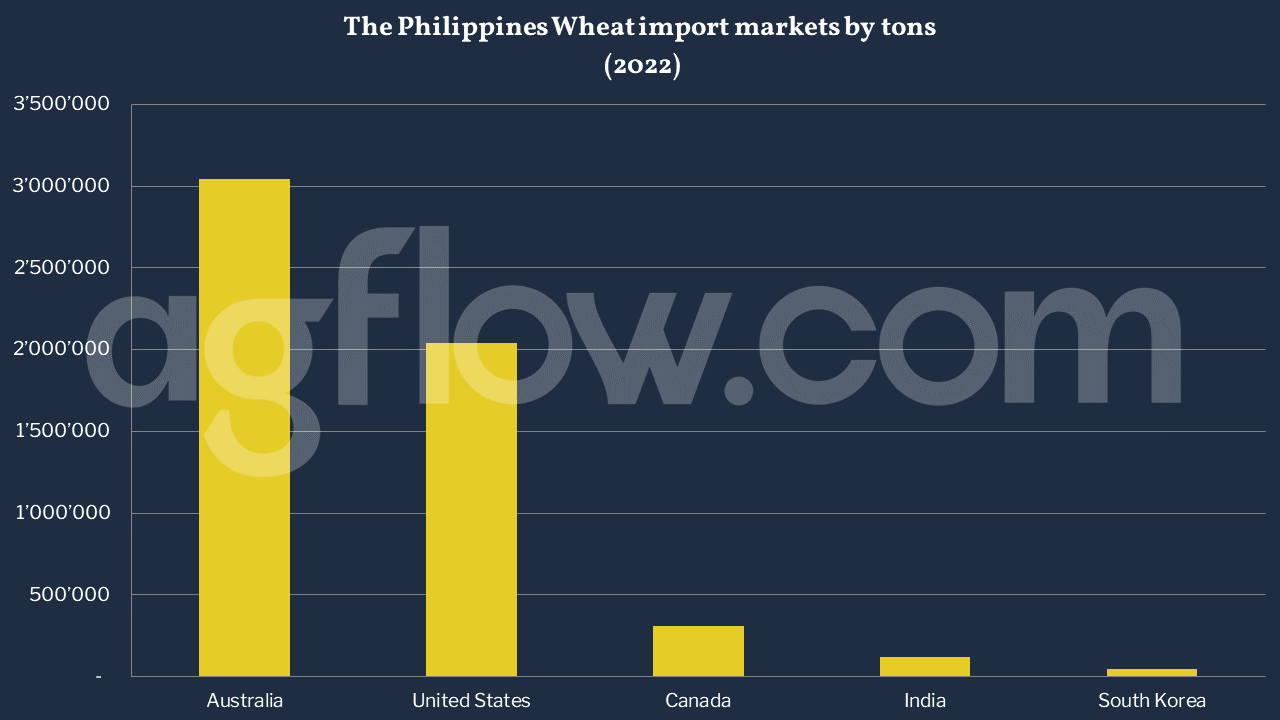India Emerges in the Philippine’s Wheat Market
Reading time: 2 minutes
Wheat cannot be grown in the Philippines sufficiently since most Wheat varieties only thrive in cold temperatures. Hence, the need to outsource. The country was importing about 95 percent of its Wheat requirements from the United States. However, there have been continuing studies on how to increase Wheat production. The Philippines is among the top five countries that are expected to comprise a quarter of the world’s Wheat imports over the next ten years as bread and feed consumption are both going up, the Organization for Economic Cooperation and Development (OECD) said.
FAS Manila estimates MY 2022/23 feed Wheat consumption at 2.5 million MT, down 200,000 MT compared to USDA Official, because of expectations that some demand will shift to corn. FSI Consumption for MY 2022/23 is at 3.6 million MT, lower by 250,000 MT compared to USDA Official, because of lower demand expectations expressed by industry contacts and commodity groups. Higher milling Wheat prices will shift some consumption from higher-priced bread to rice. Milling Wheat and feed Wheat prices have eased but are still high compared to $329 per MT in October 2021.
The wholesale price of Wheat in the Philippine peso was PHP 19 per kg (2022). The official Suggested Retail Prices (SRPs) of bread and noodles remained unchanged. However, there was already a pronouncement by the Department of Trade and Industry that it will release new SRPs by January 2023. MY 2022/23 ending stocks were adjusted downward to 1.7 million MT in anticipation of higher drawdown usage because of lower Wheat imports. FAS Manila changed MY 2021/22 import figures to align with historical trade data.
Trade FAS Manila estimates Wheat imports for MY 2022/23 at 5.8 million MT, down 900,000 MT compared with USDA Official because of higher Wheat prices and competitive corn quotes, as mentioned by industry contacts. MY 2022/23 Quarter 1 global Wheat exports reflected a severe drop of 30 percent. Also, the MY 2022/23 Quarter 1 applications for SPSICs reflected a 51 percent drop in volume applied from 1,430,290 MT, compared to 2,907,066 MT in the previous period. The MY 2021/22 import figure was adjusted to reflect historical trade data.

The Philippines Wheat Import
According to the AgFlow data, Australia led its import market with 3 million tons of Wheat in the last year, followed by the United States (2 million tons), Canada (0.3 million tons), India (0.1 million tons), and South Korea (45,000 tons). The import volume totaled 0.9 million tons in January-February 2022.
The Philippines asked Canada to encourage its licensed grain facilities to continue exporting Wheat to the country to ensure local supply. Agriculture Secretary William Dar made the request to Canadian Ambassador Peter MacAthur in a last year’s meeting. During the meeting, Secretary Dar urged Ambassador MacArthur to continuously advocate for the undisrupted flow of trade of critical commodities to address the impact of stagflation.
In 2020, the Philippines imported Wheat worth $1.49 billion, becoming the 8th largest Wheat importer in the world. The same year, Wheat was the 7th most imported product in the Philippines. The Philippines imports Wheat primarily from: the United States ($810 million), Australia ($168 million), Romania ($122 million), Ukraine ($119 million), and Russia ($110 million). In 2021, Filipino traders imported 1.02 million tons of Ukrainian Wheat for flour production, making the Philippines the No.6 biggest importer of the grain from the embattled country, according to data from Standard & Poor’s.
Among the major commodity groups, grains worth USD 663.01 million (FOB value) contributed the largest share of 17.2 percent to the total agricultural imports in the second quarter of 2021. During mid-2022, four vessels brought Wheat monthly to important ports in Manila, Cebu, Iligan, Iloilo, and Davao.
Other sources: USDA
Try AgFlow Free
Access Free On Updates for Corn, Wheat, Soybean,
Barley, and Sunflower Oil.
No Credit Card Required & Unlimited Access In Time

